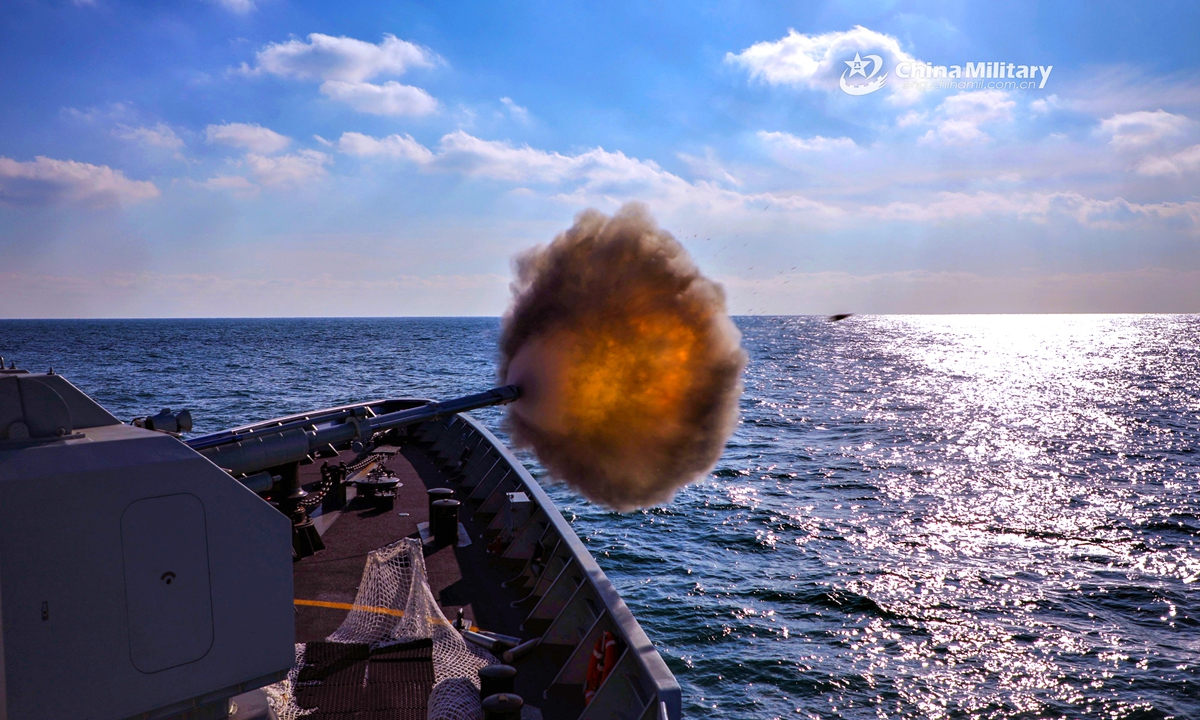
The guided-missile frigate Zhangjiakou (Hull 605) attached to a frigate flotilla with the navy under the PLA Northern Theater Command fires its main-gun against mock sea targets during a maritime training exercise in waters of the Yellow Sea in mid December, 2020. (eng.chinamil.com.cn/Photo by Wang Guangjie)
The US Navy will reportedly hold a rare, large-scale exercise on China's doorstep in the Yellow Sea that celebrates the anniversary of a battle in the Korean War (1950-53,) a move experts said on Wednesday is provocative and will escalate tensions in the Korean Peninsula, but it poses only a laughable threat from a military point of view.
A US amphibious ready group led by the USS
America amphibious assault ship and the Canadian frigate HMCS
Vancouver will participate in an event to mark the 73rd anniversary of the Battle of Incheon during the Korean War and the 70th anniversary of the US-South Korea alliance, the South China Morning Post reported on Wednesday, citing a South Korean defense ministry official.
The group will also hold a large-scale joint amphibious operation drill between the US and South Korea, the report said, citing senior South Korean government officials.
In the exercise, the USS
America amphibious assault ship could practice troop delivery onto coastal regions of the Korean Peninsula via its Osprey tilt-rotor transport aircraft and air-cushioned landing craft, with vessel-borne short takeoff and vertical landing-capable F-35B fighter jets conducting air strikes, Wei Dongxu, a Beijing-based military expert, told the Global Times on Wednesday.
"It would be a blatant show of force," Wei said.
The exercise will mark yet another US escalation in its flame-fanning of the Korean Peninsula issue, as it will lead to regional tensions and bloc confrontation only to serve the US' selfish geostrategic interests in the Asia-Pacific region, said Zhang Junshe, a senior research fellow at the Naval Research Academy of the People's Liberation Army (PLA).
Zhang told the Global Times that the exercise further shows that the US is a troublemaker that sabotages peace and stability in the region.
The South China Morning Post quoted analysts as saying that a US military exercise in the Yellow Sea, a secure area for China, is not common, and it sends a signal of deterrence against China that "the US can project military presence across all of China's near seas."
It is laughable to say that the US exercise in the Yellow Sea could form a so-called deterrence against China, because any hostile target in the Yellow Sea would be directly exposed to PLA air, maritime and ground fire, Zhang said.
"How would living targets of the PLA deter China?" Zhang asked. It goes the same for the Taiwan Straits, and the thinking behind the belief that such shows of force could deter China is merely self-deception, he said.
The Battle of Incheon took place from September 10 to 19 in 1950 featuring the Incheon Landing.
While the US-led United Nations Command won the Battle of Incheon, the US forces' arrogant, rash advances consequently forced the Chinese People's Volunteers to join the War to Resist US Aggression and Aid Korea, leading to successive defeats of US forces, analysts said.
The US military should remember the history and learn from the lesson that provocations will in the end lead to self-failures, Wei said.




